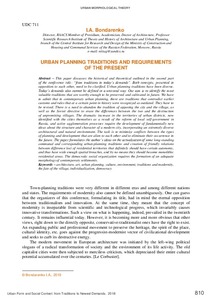Показать сокращенную информацию
URBAN PLANNING TRADITIONS AND REQUIREMENTS OF THE PRESENT
| Автор | Bondarenko, I.A. | |
| Дата внесения | 2019-07-10T09:47:01Z | |
| Дата, когда ресурс стал доступен | 2019-07-10T09:47:01Z | |
| Дата публикации | 2019-05 | |
| ISBN | 978-5-7638-4127-5 | |
| URI (для ссылок/цитирований) | https://elib.sfu-kras.ru/handle/2311/111756 | |
| Описание | Proceedings of the XXV ISUF International Conference “Urban Form and Social Context: from Traditions to Newest Demands” (Krasnoyarsk, July 5–9, 2018) | ru_RU |
| Аннотация | This paper discusses the historical and theoretical outlined in the second part of the conference title: “from traditions to today’s demands”. Both concepts, presented in opposition to each other, need to be clarified. Urban planning traditions have been diverse. Today’s demands also cannot be defined in a univocal way. Our aim is to identify the most valuable traditions that are worthy enough to be preserved and cultivated in future. We have to admit that in contemporary urban planning, there are traditions that contradict earlier customs and rules that at a certain point in history were recognized as outdated. They have to be revised. There is a need to abandon the tradition of opposing the city and the village, as well as the Soviet directive to erase the differences between the two and the destruction of unpromising villages. The dramatic increase in the territories of urban districts, now identified with the cities themselves as a result of the reform of local self-government in Russia, and active agglomeration processes require the development of fundamentally new ideas about the structure and character of a modern city, incorporating an extremely diverse architectural and natural environment. The task is to minimize conflicts between the types of planning and development that are alien to each other and to eliminate their occurrence in the future. The paper formulates the author’s ideas on the actualization of some long-standing communal and corresponding urban-planning traditions and creation of friendly relations between difference loci of residential territories that definitely should have certain autonomy, and thus have wide enough spatial breaches, and by no means they should become monolithic residential areas. The democratic social organization requires the formation of an adequate morphology of contemporary settlements. | ru_RU |
| Язык | en | ru_RU |
| Издатель | Siberian Federal University | ru_RU |
| Издатель | Сибирский федеральный университет | ru_RU |
| Тема | architecture, art, urban planning, culture, environment, traditions and modernity, the fate of the village, individualization, democracy | ru_RU |
| Название | URBAN PLANNING TRADITIONS AND REQUIREMENTS OF THE PRESENT | ru_RU |
| Тип | Conference Item | ru_RU |
| Тип | Conference Paper | ru_RU |
| Контакты автора | Bondarenko I.A.: Director, RAACS Member of Presidium, Academician, Doctor of Architecture, Professor Scientific Research Institute of Theory and History of Architecture and Urban Planning, branch of the Central Institute for Research and Design of the Ministry of Construction and Housing and Communal Services of the Russian Federation, Moscow, Russia e-mail: niitag@yandex.ru | ru_RU |
| Страницы | 810- 815 | ru_RU |
| Место издания | Красноярск | ru |
| Место издания | Krasnoyarsk | en |

